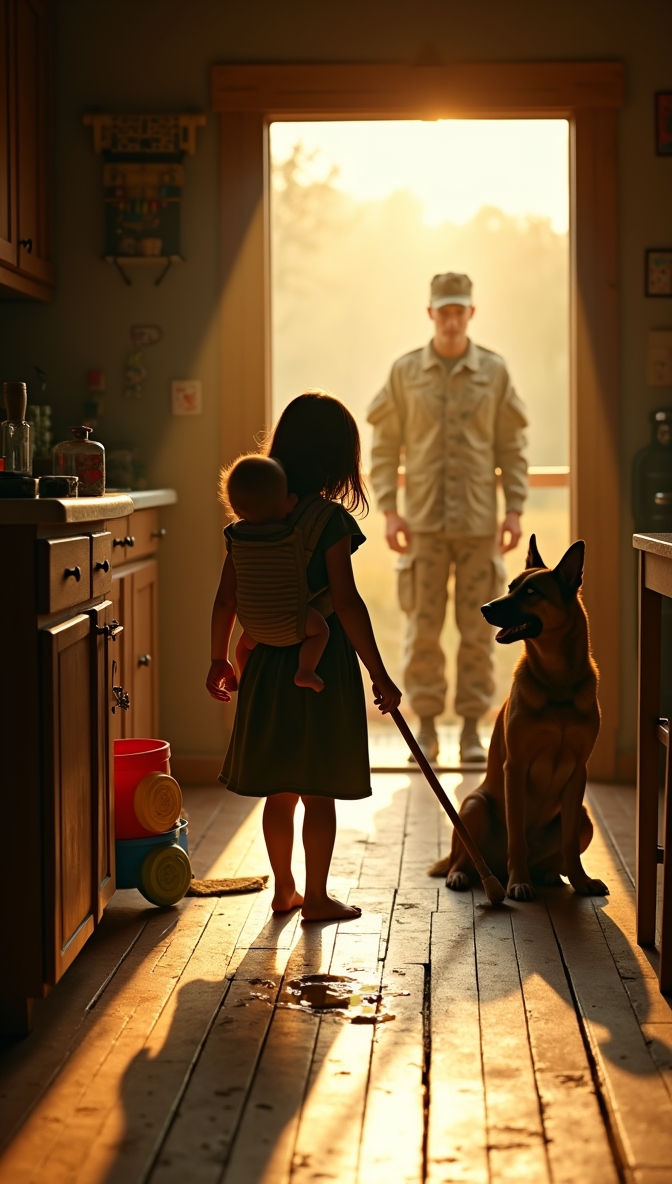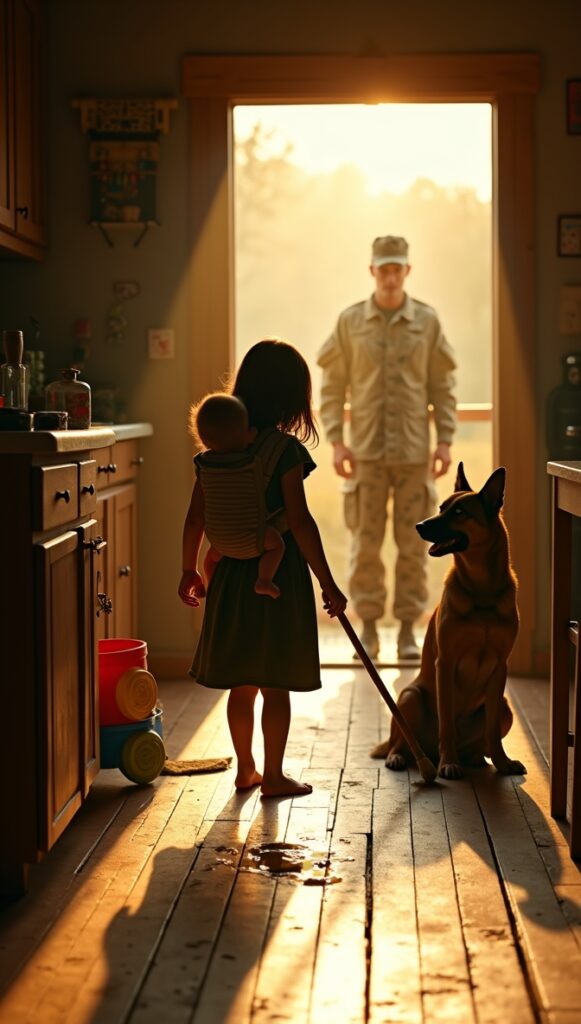When I Came Home From War, My Daughter Was Raising Her Brother Alone — And The Dog Was The Only One Who Stayed…
The first thing Daniel Hayes noticed was the silence. It wasn’t peaceful — it was hollow, the kind that seeps through your bones when something’s gone wrong. After two years in Afghanistan, Staff Sergeant Hayes thought he was ready for anything. He had faced ambushes, explosions, nights where sleep came in one-hour shifts. But nothing had prepared him for the quiet heartbreak waiting for him at home.
The air smelled of burned leaves as he stepped off the bus, his duffel bag slung over his shoulder, his heart full of anticipation. The house on Oakwood Street stood at the end of the lane — white paint chipped, the porch light flickering weakly in the dusk.
He smiled despite the fatigue. Home. Finally. But as he got closer, the smile faded.
The yard was wild, grass grown high around the mailbox. Toys lay scattered in the dirt — a broken tricycle, a faded teddy bear. The front door hung slightly ajar.
Then he saw her.
Emily. Nine years old now, hair tangled, cheeks pale. She was sitting on the porch, clutching a small boy — Joshua, his four-year-old son — to her chest. A German Shepherd stood in front of them, teeth bared, body tense. When the dog recognized him, it whined and wagged its tail. Emily’s head jerked up. For a moment, she stared — as if she couldn’t trust her own eyes.
Then she whispered, “Daddy?”
Daniel dropped his bag and knelt. Emily threw herself into his arms, sobbing, Joshua clinging to his leg. He held them tight, too stunned to speak.
When the tears slowed, he asked the question that had been burning in his throat.
“Where’s your mother?”
Emily hesitated. Her little chin quivered.
“She’s gone, Daddy. She left… a long time ago.”
Daniel’s stomach sank. “Gone? What do you mean ‘gone’?”
“She left with another man,” Emily whispered. “She said she’d come back. But she didn’t.”

The Empty House
Inside, the house was cold. The curtains hung limp, the air stale. Half the drawers were empty — her clothes, her things, gone. Dishes piled in the sink, mail stacked on the counter. Daniel walked from room to room like a ghost, each step heavier than the last.
In the bedroom, the closet door gaped open. Her wedding dress — once kept in plastic, preserved like a promise — was gone. But his uniform still hung neatly on the back of the chair, pressed, just as she’d left it.
Emily stood in the doorway, watching him.
“I tried to keep everything clean,” she said softly. “But I couldn’t reach the top shelves.”
He turned and saw her small hands — dry, cracked, blistered. His heart shattered.
“Emily… how long have you been taking care of Joshua?”
Her lip trembled. “Since Christmas. He got sick once, but Max stayed by him all night. I didn’t know what to do, Daddy. I just… kept waiting for you.”
Daniel sank to his knees and hugged her again. “You did everything right, sweetheart. Everything.”
That night, after putting the kids to bed, Daniel sat alone in the kitchen, lit only by the yellow flicker of a dying bulb. Max lay at his feet, eyes watchful. He opened the mail — bills, expired notices, and finally, a letter addressed to Rachel Hayes. He recognized the handwriting. It wasn’t his. He read the first line and felt his chest tighten.
“Rachel, I can’t keep waiting like this. He’s coming home soon — and you need to decide. We can’t hide forever.”
It was signed, “T. Mallory.”
A name he didn’t know. The paper trembled in his hands.
He wanted to hate her. Wanted to rage, to curse, to break something. But all he could see were the faces of his children asleep upstairs — how small they looked under the thin blankets, how quiet the house was without her. He folded the letter carefully and tucked it into his pocket.
The next morning, Daniel went to the police. They confirmed what he feared: Rachel had emptied their joint account six months ago. There was no missing person report — because she wasn’t missing. She had chosen to disappear.
A neighbor, Mrs. Cole, stopped him on his way home.
“She left fast,” the old woman said, her voice low. “A man came by in a red truck. They argued outside, then drove off together. The kids were crying. We tried to help, but she told us not to interfere.”
Daniel thanked her, but inside, he was unraveling. He couldn’t understand how someone could walk away from two children. From them.
Days turned into weeks. Daniel fixed what he could — the door hinge, the broken faucet, the roof.
He cooked, cleaned, packed lunches, and tried to learn how to braid Emily’s hair. Sometimes, when the kids were asleep, he’d sit by the window with a cup of black coffee, listening to the wind. Max would rest his head on Daniel’s knee, the quietest kind of comfort.
He started having nightmares again — not of war, but of home. Dreams of Rachel’s voice calling his name, then fading into the sound of the engine that took her away.
One morning, Emily found him sitting outside with a photo in his hand — their wedding picture.
“Do you still love her?” she asked.
He hesitated. “I don’t know.”
“She hurt you.”
He smiled faintly. “Sometimes people you love do that. But it doesn’t mean you stop caring.”
Emily thought for a while, then said, “Max still waits by the gate every day. He thinks she’ll come back.” Daniel looked at the dog, tail curled on the porch, eyes fixed on the road. “Maybe we all do,” he whispered.
It was a rainy evening when the knock came. Daniel opened the door — and froze. Rachel stood there, drenched, eyes red, hair plastered to her face. She looked thinner, older, but unmistakably her. Behind her, headlights faded into the night — a red pickup truck driving away.
She stepped forward, trembling. “Daniel… please. I had nowhere else to go.”
Max barked, low and threatening, standing between them. Emily appeared on the stairs, Joshua clutching her arm. The room fell silent. Daniel’s voice was calm but hollow. “You left them.”
Tears streamed down her face. “I made a mistake. I thought I loved him. I thought—”
“You thought wrong,” he cut in. “And they paid the price.”
Rachel reached out. “Please. Just let me see them.”
Emily stepped closer, shaking her head. “No.”
That one word — small, defiant — seemed to pierce Rachel’s chest. She dropped her hand and looked at Daniel. “I deserve that.”
He didn’t argue. Instead, he said quietly, “If you really want to see them… come back when you’re ready to stay.” Then he closed the door.
Months passed. Spring came, soft and forgiving. Daniel found a job at the local construction firm. Emily started school again. Joshua began drawing pictures of their family — always with Max in the middle. Every morning, Daniel saw the red mailbox glinting in the sun, and for a moment, he’d wonder if today would be the day she returned.
Sometimes he hoped she wouldn’t. Sometimes he hoped she would.
One evening, Emily asked, “Daddy, do you think she misses us?”
He thought for a long time, watching Max chase fireflies in the yard.
“I think,” he said slowly, “some people miss what they had… but not enough to come back.”
Emily nodded, resting her head on his shoulder. And for the first time in a long while, Daniel felt peace. Still, at night, when the wind shifts and the porch creaks, he sometimes turns — just for a second — expecting to see her silhouette in the doorway. But it’s only the dog.
Waiting. Always waiting.
“Maybe love doesn’t always mean coming back. Sometimes, it’s choosing to stay — even when the person who left never does.”


